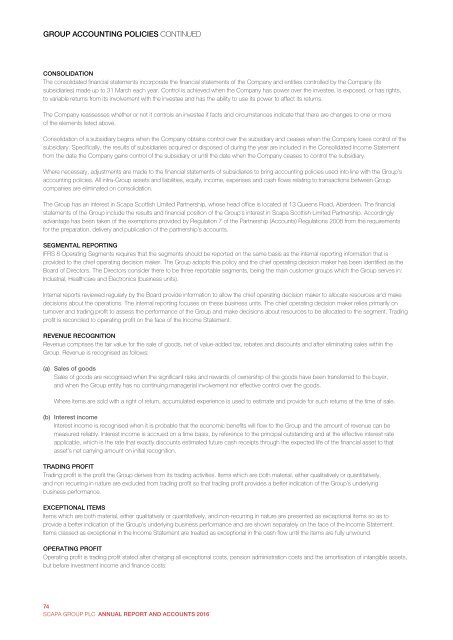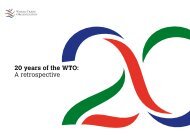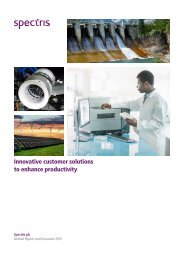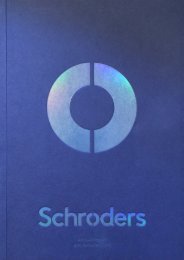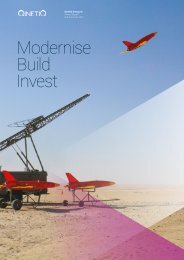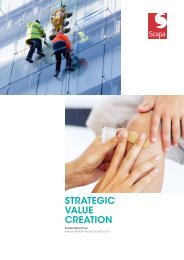20645_Scapa_AR_160504
Create successful ePaper yourself
Turn your PDF publications into a flip-book with our unique Google optimized e-Paper software.
GROUP ACCOUNTING POLICIES CONTINUED<br />
CONSOLIDATION<br />
The consolidated financial statements incorporate the financial statements of the Company and entities controlled by the Company (its<br />
subsidiaries) made up to 31 March each year. Control is achieved when the Company has power over the investee, is exposed, or has rights,<br />
to variable returns from its involvement with the investee and has the ability to use its power to affect its returns.<br />
The Company reassesses whether or not it controls an investee if facts and circumstances indicate that there are changes to one or more<br />
of the elements listed above.<br />
Consolidation of a subsidiary begins when the Company obtains control over the subsidiary and ceases when the Company loses control of the<br />
subsidiary. Specifically, the results of subsidiaries acquired or disposed of during the year are included in the Consolidated Income Statement<br />
from the date the Company gains control of the subsidiary or until the date when the Company ceases to control the subsidiary.<br />
Where necessary, adjustments are made to the financial statements of subsidiaries to bring accounting policies used into line with the Group’s<br />
accounting policies. All intra-Group assets and liabilities, equity, income, expenses and cash flows relating to transactions between Group<br />
companies are eliminated on consolidation.<br />
The Group has an interest in <strong>Scapa</strong> Scottish Limited Partnership, whose head office is located at 13 Queens Road, Aberdeen. The financial<br />
statements of the Group include the results and financial position of the Group’s interest in <strong>Scapa</strong> Scottish Limited Partnership. Accordingly<br />
advantage has been taken of the exemptions provided by Regulation 7 of the Partnership (Accounts) Regulations 2008 from the requirements<br />
for the preparation, delivery and publication of the partnership’s accounts.<br />
SEGMENTAL REPORTING<br />
IFRS 8 Operating Segments requires that the segments should be reported on the same basis as the internal reporting information that is<br />
provided to the chief operating decision maker. The Group adopts this policy and the chief operating decision maker has been identified as the<br />
Board of Directors. The Directors consider there to be three reportable segments, being the main customer groups which the Group serves in:<br />
Industrial, Healthcare and Electronics (business units).<br />
Internal reports reviewed regularly by the Board provide information to allow the chief operating decision maker to allocate resources and make<br />
decisions about the operations. The internal reporting focuses on these business units. The chief operating decision maker relies primarily on<br />
turnover and trading profit to assess the performance of the Group and make decisions about resources to be allocated to the segment. Trading<br />
profit is reconciled to operating profit on the face of the Income Statement.<br />
REVENUE RECOGNITION<br />
Revenue comprises the fair value for the sale of goods, net of value-added tax, rebates and discounts and after eliminating sales within the<br />
Group. Revenue is recognised as follows:<br />
(a) Sales of goods<br />
Sales of goods are recognised when the significant risks and rewards of ownership of the goods have been transferred to the buyer,<br />
and when the Group entity has no continuing managerial involvement nor effective control over the goods.<br />
Where items are sold with a right of return, accumulated experience is used to estimate and provide for such returns at the time of sale.<br />
(b) Interest income<br />
Interest income is recognised when it is probable that the economic benefits will flow to the Group and the amount of revenue can be<br />
measured reliably. Interest income is accrued on a time basis, by reference to the principal outstanding and at the effective interest rate<br />
applicable, which is the rate that exactly discounts estimated future cash receipts through the expected life of the financial asset to that<br />
asset’s net carrying amount on initial recognition.<br />
TRADING PROFIT<br />
Trading profit is the profit the Group derives from its trading activities. Items which are both material, either qualitatively or quantitatively,<br />
and non recurring in nature are excluded from trading profit so that trading profit provides a better indication of the Group’s underlying<br />
business performance.<br />
EXCEPTIONAL ITEMS<br />
Items which are both material, either qualitatively or quantitatively, and non-recurring in nature are presented as exceptional items so as to<br />
provide a better indication of the Group’s underlying business performance and are shown separately on the face of the Income Statement.<br />
Items classed as exceptional in the Income Statement are treated as exceptional in the cash flow until the items are fully unwound.<br />
OPERATING PROFIT<br />
Operating profit is trading profit stated after charging all exceptional costs, pension administration costs and the amortisation of intangible assets,<br />
but before investment income and finance costs.<br />
74<br />
SCAPA GROUP PLC ANNUAL REPORT AND ACCOUNTS 2016<br />
69<br />
Annual Report and Accounts 2016 <strong>Scapa</strong> Group plc


